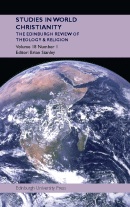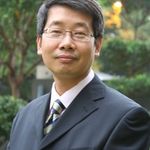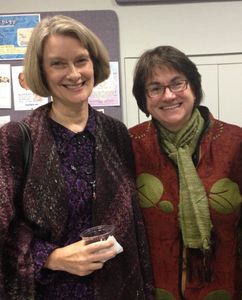News of the extended network of faculty, alumni, students, visiting researchers, and mission partners is regularly updated, and some of the big ideas or major events in Global Christianity are covered in the CGCM News.
Alum Profile: Romeo del Rosario, Ph.D. 1981

Dr. Romeo del Rosario is a missionary and the director of the Cambodia Mission Initiative in the General Board of Global Ministries of The United Methodist Church. He is also teaching at the Cambodian Methodist Bible School (CMBS), training numerous local leaders for the Cambodian Methodist Church. In addition, he is serving as the chair of the theological education committee, which is responsible for the continuing theological training of pastors and church workers in Cambodia.
He received his Ph.D. in theological and religious studies, with a major in ecumenics and mission, from Boston University in 1981. His dissertation analyzed and described the schism which occurred in the Methodist Episcopal Church in the Philippines in 1933, focusing on the struggle for autonomy and indigenization within the Methodist Episcopal Church in the Philippines.
After earning his degree, Dr. Rosario has served many countries as a missionary and teacher for more than 25 years since the mid-1980s: From 1985 to 1988, he taught at Theological Hall (now Sierra Leone Theological College) in Sierra Leone, West Africa. From 1989 to 1992, Dr. Rosario worked as liaison between the United Methodist Church and the Middle East Council of Churches in Jerusalem, West Bank. Then, he served as a lecturer and then dean of the Sabah Theological Seminary in Malaysia from 1992 to 2001. Before taking his current position in Cambodia, he worked for the Union Theological Seminary in the Philippines as an officer-in-charge.
Acknowledging his achievements, Boston University School of Theology named him as one of the four winners of the 2012 Distinguished Alumni Award. He is currently involved in a very important project for the future of the Methodist Church in Cambodia: With the goal of an autonomous Methodist Church in Cambodia by 2016, he is playing a leading role in writing the Book of Discipline in Cambodia.
Profile by Hye Jin Lee.
New David Scott article
 The latest issue of Mission Studies contains a new article by doctoral student David Scott entitled "Alcohol, Opium, and the Methodists in Singapore: The Inculturation of a Moral Crusade.” (Mission Studies 29 (2012): 147–162.) Although the full-text article is only available to subscribers, David included the following abstract for those who might be interested in digging it up.
The latest issue of Mission Studies contains a new article by doctoral student David Scott entitled "Alcohol, Opium, and the Methodists in Singapore: The Inculturation of a Moral Crusade.” (Mission Studies 29 (2012): 147–162.) Although the full-text article is only available to subscribers, David included the following abstract for those who might be interested in digging it up.
Abstract: The Methodist Episcopal Church was strongly committed to the temperance movement in nineteenth-century America. This commitment rested on assumptions about the negative impacts of alcohol and was expressed through campaigns for personal moral reform and political prohibition. When Methodist missionaries arrived in Singapore in the late nineteenth century, they encountered a society in which opium was the most commonly abused drug. In this new context, Methodist missionaries adapted their concerns about alcohol and their methods of opposing the liquor trade and applied these concerns and methods to opium and the opium trade instead. This case study raises important questions about the inculturation of morality as an aspect of the missionary enterprise, a topic which is insufficiently addressed in literature on theological inculturation.
Ireland article in “Studies in World Christianity”
 CGCM is well represented in the latest issue of Studies in World Christianity. A new article by graduate student, Daryl Ireland, entitled Becoming Modern Women: Creating a New Female Identity through John Sung's Evangelistic Teams appears in the issue. There is also an article entitled Major Protestant Revivals in Korea, 1903-1935 by alumnus Sung-Deuk Oak. There is also a review by Dana L. Robert, the CGCM Director, of Johanna M. Selles recent book on the first thirty years of the World Student Christian Federation. Full-text is available to subscribers and through subscribing libraries.
CGCM is well represented in the latest issue of Studies in World Christianity. A new article by graduate student, Daryl Ireland, entitled Becoming Modern Women: Creating a New Female Identity through John Sung's Evangelistic Teams appears in the issue. There is also an article entitled Major Protestant Revivals in Korea, 1903-1935 by alumnus Sung-Deuk Oak. There is also a review by Dana L. Robert, the CGCM Director, of Johanna M. Selles recent book on the first thirty years of the World Student Christian Federation. Full-text is available to subscribers and through subscribing libraries.
New Bellofatto article on Diasporas
Doctoral student Gina Bellofatto has an important new article entitled "People and Their Religions on the Move: Challenge and opportunities of international migration" available here on The Lausanne Movement's website.
Hillary Clinton: Methodist
A new Washington Post story about Hillary Clinton's time as Secretary of State describes her as "a wonky Methodist who believes she is supposed to make good things happen." Clinton has in the past credited motive magazine as an important formative influence. You can find the story here.
Bevans addresses practical theology/missiology consultation
On November 1st, Dr. Stephen Bevans opened an engaging interchange between missiology and practical theology. In "Forging a Conversation," Bevans described how the two fields compliment one another without collapsing either discipline into the other. Subsequent presentations were made by faculty of STH: David Jacobsen, Dana Robert, Bryan Stone, and Thomas Thangaraj. Each presenter provided succinct descriptions of his or her own field, as well as impressions of their counterpart's. This led to ever-deepening exchanges. Dean Bryan Stone, for instance, could reply to Dr. Dana Robert's representation of Practical Theology by saying, "I don't recognize my discipline at all in what you just said." He then went on to give an alternative vision of Practical Theology, and thereby opened up yet other possibilities for collaboration with missiology. The lunch concluded with questions for the panel, but was in some ways extended into the evening when Professor Bevans gave the Brown Lecture in Practical Theology.
Alum Profile: Xiyi Yao, Th.D. 2000
 Xiyi Yao is an associate professor of World Christianity and Asian Studies at Gordon-Conwell Theological Seminary. He has been an active scholar, publishing numerous works in both English and Chinese. He has a variety of research interests, including the history of Protestant missions and mission theology; the fundamentalist and evangelical movements in China and America; comparative studies of Christianities in China, Korea and Japan; history of Christian pacifism in China; Chinese traditional religions and culture, and their relation with Christianity; and Christian thoughts in contemporary China.
Xiyi Yao is an associate professor of World Christianity and Asian Studies at Gordon-Conwell Theological Seminary. He has been an active scholar, publishing numerous works in both English and Chinese. He has a variety of research interests, including the history of Protestant missions and mission theology; the fundamentalist and evangelical movements in China and America; comparative studies of Christianities in China, Korea and Japan; history of Christian pacifism in China; Chinese traditional religions and culture, and their relation with Christianity; and Christian thoughts in contemporary China.
He received his Th.D. from the School of Theology at Boston University in 2000. His dissertation uncovered and clarified the roots of the fundamentalist movement among Protestant missionaries in China focusing on the fundamentalist missionaries’ views and engagement in various aspects of the mission enterprise in China. In this work, he paid particular attention to examining major historical events, issues, individuals, and organizations involved in the fundamentalist missionaries’ fundamentalist campaign in China.
Before coming to his current position at Gordon-Conwell, he worked in Hong Kong and mainland China and was involved in various scholarly works: From 2001 to 2003, he served as a Beijing-based consultant for the China Educational Exchange, a North American Mennonite program. Then, from 2003 to 2010, he worked as an assistant professor at the Department of Theological Studies in China Graduate School of Theology (CGST), in Hong Kong. He has been serving as an associate of the Mennonite Mission Network (U.S.A.) since 2003 as well.
His current research projects are: to trace the history and heritage of the Hunan Bible Institute (Biola in China, 1916-1949). In addition, he is also involved in researching the heritage and theology of Wang Wei-fan, a famous Chinese scholar, as a case study of Protestant theology in contemporary China.
Links:
Gordon-Conwell Theological Seminary http://www.gordonconwell.edu/
Mennonite Mission Network http://www.mennonitemission.net
by Hye Jin Lee
News items about ERI and CGCM collaboration
Two articles about the ERI and CGCM collaboration appeared in the October 2012 issue of ERI's newsletter. Both are included here.
Dr. Elizabeth Brusco delivers Berger lecture
Dr. Elizabeth Brusco, an anthropologist and one of the foremost authorities on global Pentecostalism and gender, gave the second annual Peter Berger lecture. It was entitled “Barred from the Pulpit, Absent from the Stage, and Missing in the Analysis: Why We Must Keep Women in the Foreground in Understanding Global Pentecostalism.”


Report from the 2012 ASM Eastern Fellowship
Three faculty members--Drs. Robert, Daneel, and Thangaraj--and seven students attended the 2012 ASM Eastern Fellowship last weekend. Daewon Moon filed the following report:

The 2012 ASM Eastern Fellowship was held at the Maryknoll Sisters Center in Maryknoll, New York on November 2–3, with the theme “Classics of Mission Spirituality.” STH alum, Prof. Ben Hartley of Palmer Seminary, presided.
Dr. Rady Roldan-Figueroa of Boston University gave his presentation on the spirituality of Bartholome de Las Casas (1484–1566), a Dominican missionary and social reformer in the Americas. Roldan-Figueroa
discussed the significance of Las Casas’ treatise “De unico vocationis modo” (“On the Only Way of Conversion”), focusing on distinctive characteristics of sixteenth-century Spanish spirituality in the Observance movement within the religious orders.
Sister Claudette LaVerdiere of the Maryknoll Sisters presented her research on the spirituality of Mother Mary Joseph Rogers (1882–1955), the founder of the Maryknoll order. While a student at Smith College in 1904, Mary Josephine organized a Mission Study Club for Catholic students. Her recognition of women’s power for mission significantly contributed to the formation of the Maryknoll Sisters, which sent its first missionary sisters to China in 1921. Mother Mary Joseph’s focus
on cultivating character became an integral part of the spirituality of the Maryknolls, who adopted the motto “Making God’s love visible.”

Dr. Grace May of City Seminary of New York gave a talk on Margaret Emma Barber (1866–1929), a missionary to China who was a spiritual mentor of Watchman Nee, the most influential leader in the Chinese house church movement. Strongly influenced by the Keswick holiness movement in England, Barber emphasized the discipleship training of indigenous people, particularly the training of local “Bible women” to reach out to other women.

